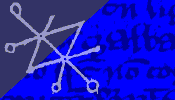2017 Congress Preparations
September 17, 2016 in Conference Announcement, International Congress on Medieval Studies, Kalamazoo
Sessions
Co-Sponsored by the Research Group on Manuscript Evidence
at the 52nd International Congress on Medieval Studies
11–14 May 2017
After the Call for Papers
(Deadline 15 September 2016)
We now select the programs for the Sessions
With the achievement of our Activities at the 2016 International Congress on Medieval Studies, we give both a 2016 Congress Report and a special Behind the Scenes Report (Also Known As “Doctor Who Done It”). Now we proceed to preparations for the 2017 Congress. Now that the timetable for the Call for Papers has been completed, we prepare the programs of the Sessions.
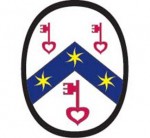 The full 2017 Call for Papers for 52nd ICMS lists Session Titles and Sponsors. Here we announce our 5 co-sponsored Sessions and describe their aims. After selecting their programs and submitting them to the Congress Committee, and as the preparations for the Congress shift into the next phase, we will announce the programs for the sessions — along with, as customary, if their authors permit, the Abstracts for the Papers. (As listed for the individual years of the Congress and for the Indexes both by Author and by Year.)
The full 2017 Call for Papers for 52nd ICMS lists Session Titles and Sponsors. Here we announce our 5 co-sponsored Sessions and describe their aims. After selecting their programs and submitting them to the Congress Committee, and as the preparations for the Congress shift into the next phase, we will announce the programs for the sessions — along with, as customary, if their authors permit, the Abstracts for the Papers. (As listed for the individual years of the Congress and for the Indexes both by Author and by Year.)
As in recent years, we co-sponsor Sessions with the Societas Magica (2 Sessions) and the Center for Medieval and Early Modern Studies at the University of Florida (2 Sessions). It will be the 12th year of co-sponsorship with the Societas Magica, and the fourth year with the Center for Medieval and Early Modern Studies. This year, for the first time, we also co-sponsor a Round-Table with a community of 5 other Co-Sponsors (including the Societas Magica), headed by AVISTA.
Also, like the 2016 Congress, we plan for
- an Open Business Meeting and
- a co-sponsored Reception with the Index of Christian Art at Princeton University.
Glimpses of our co-sponsored Receptions at the Congress appear in the souvenirs of our Celebrations and in the Reports for the individual Congresses (2016, 2015, and 2014 Anniversary).
The Agendas for our Open Business Meetings in both 2015 and 2016 serve as concise Reports for our Activities, Plans, and Desiderata.
We look forward to your contributions.
Sessions
I. Co-Sponsored with the Societas Magica
1. Islamic Magic: Texts and/as Objects
Despite the recent burgeoning of the field of Islamic occultism, the vast majority of manuscripts dealing with astrology, various forms of magic and divination, and ecstatic practices remain untapped. Such objects represent a primary basis for both the intellectual and material-cultural history of Islamic civilization, and show the interdependence of these categories; they further require the recovery of discourses heretofore elided in modern scholarship on Islamic history. This session, which introduces a number of newly discovered Arabic manuscripts, highlights the special status of these manuscripts as texts and evocative objects, with particular attention to their visual elements.
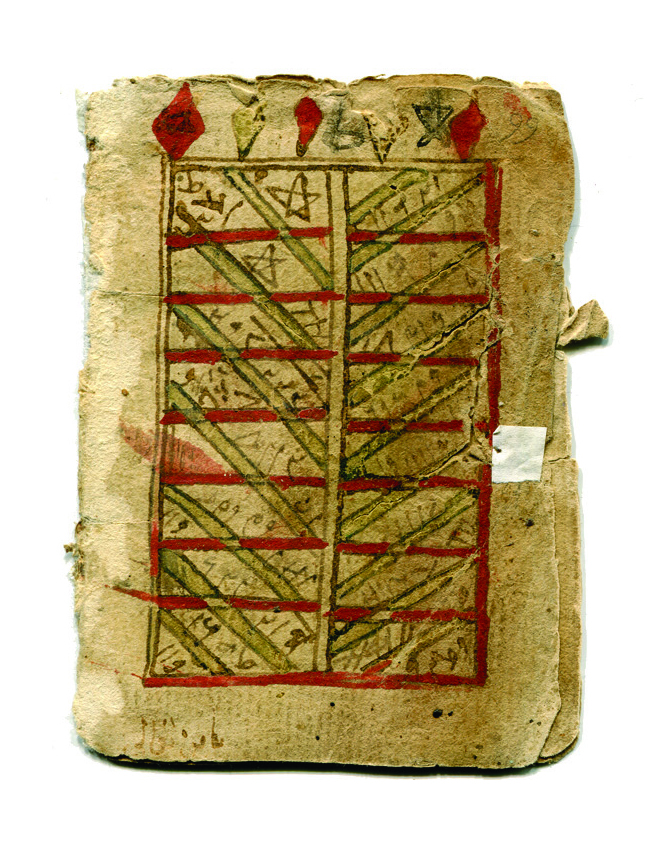
First recto of a fragmentary bifolium in Arabic on paper, from a small manuscript, circa 16th century CE. Text probably occult. See our Gallery of ‘Scripts on Parade’.
Co-organized by
Liana Saif
Faculty of Oriental Studies
Pusey Lane
University of Oxford
Oxford OX1 2LE
United Kingdom
Matthew Melvin–Koushki
Department of History
University of South Carolina
224 Gambrell Hall
Columbia, SC 2920
2. Manuscripts to Materials
To practice learned magic in the pre-modern world one could not simply go to a store or take a course. It was certainly far more complicated than slavishly following a set of techniques. A would-be practitioner had to acquire manuscripts, interpret them, then acquire the prescribed ingredients and build the necessary equipment based on the written instructions. Once this was accomplished and the processes completed, the results were at once highly evocative and ambiguous, requiring interpretation. Thus at two stages highly creative and imaginative processes had to be called upon. This session + display exhibition (focused on hands-on re-creations of ancient and medieval divination techniques) will examine the intersection between the creative and the learned in pre-modern magical practice.
Co-organized by
Frank Klaassens
College of Arts and Science
University of Saskatchewan
Saskatoon S7N 5A2
CANADA
David Porreca
Department of Classical Studies
University of Waterloo
200 University Avenue West
Waterloo, Ontario N2L 3G1
CANADA
II. Co-Sponsored with the Center for Medieval and Early Modern Studies
at the University of Florida
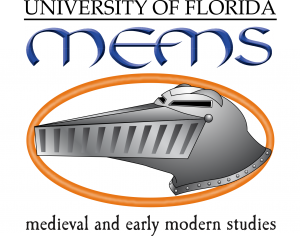 2 Sessions
2 Sessions
Co-organized by Mildred Budny (Research Group on Manuscript Evidence)
and Florin Curta (University of Florida)
3. Rulership in Medieval Central Europe
(Bohemia, Hungary, and Poland):
Ideal and Practice
Much has changed over the last 15 years or so in the study of political ideology, rituals, and symbols. The debate over ritual between Gerd Althoff and Philippe Buc has not taken into consideration the large body of literary evidence pertaining to court rituals and ideal representations of power in East Central Europe. On the other hand, this debate has only recently percolated to centers of historical research in that region. The results of those combined changes have not yet received closer scholarly scrutiny.
This session is meant to provide an overview of the most recent research on ideal rulership in theory and practice, with a particular emphasis on East Central Europe. Was the region different in that respect from Western Europe? Are there any specific features of the ideal representation of rulership in Bohemia, Poland, and Hungary? What are the most salient features of the ritual practice of power in the region?
4. Military Orders and Crusades in Comparative Perspective
(The Levant, Spain, and the Baltic Region)
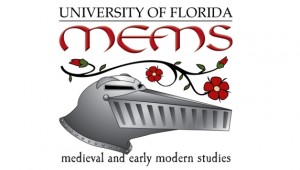 Renewed interest in the history of the military orders has resulted in a rapid proliferation of studies dedicated to the Templars, Hospitallers, and the Teutonic Knights, but no synthesis dedicated to minor orders, such as Calatrava or the Brothers of the Sword. Meanwhile, a particular sub-field of medieval archaeology dedicated initially to crusader castles in the Levant has begun to draw attention to similar phenomena in the Baltic region, inviting comparison. Aleksander Pluskowski‘s Archaeology of the Prussian Crusade (2013) is the first book to compare systematically the Holy Land and the Baltic region. Missing, however, is a comparison with the Iberian Peninsula.
Renewed interest in the history of the military orders has resulted in a rapid proliferation of studies dedicated to the Templars, Hospitallers, and the Teutonic Knights, but no synthesis dedicated to minor orders, such as Calatrava or the Brothers of the Sword. Meanwhile, a particular sub-field of medieval archaeology dedicated initially to crusader castles in the Levant has begun to draw attention to similar phenomena in the Baltic region, inviting comparison. Aleksander Pluskowski‘s Archaeology of the Prussian Crusade (2013) is the first book to compare systematically the Holy Land and the Baltic region. Missing, however, is a comparison with the Iberian Peninsula.
The session is meant to bridge that gap and to invite more discussion around the regional experiences of one and the same order (e.g., the Teutonic Knights in the Levant, Transylvania, and Prussia) or between different orders in different regions (e.g., the Order of Calatrava and the Brothers of the Sword in Spain and in Livonia respectively). The material culture and the multiple studies based on the archaeology of the landscape (that go far beyond the analysis of single castle sites) offer a very rich ground for comparative work, but most archaeologists working in the Prussian lands do not read the literature on castles in Spain, and vice-versa.
Thus, the session is meant to illustrate what can be done to revise the historical record through the already exceptional amount of information available from archaeological excavations. Considering comparative work on the military orders in crusade, both within specific orders and among them, and both within specific regions and across them, may bring to light unexpectedly shared issues, questions, and potential for enriched understanding.
Co-organized by
Mildred Budny
Research Group on Manuscript Evidence
Florin Curta
Department of History
University of Florida
202 Flint Hall
P.O. Box 32611-7320
III. Co-Sponsored with AVISTA:
 The Association Villard de Honnecourt
The Association Villard de Honnecourt
for the Interdisciplinary Study of Medieval Technology, Science, and Art
et alia
1 Round-Table
Its 3 other co-sponsors are
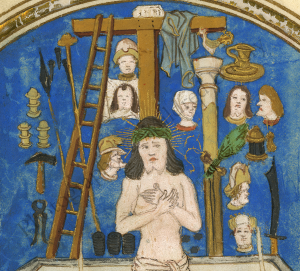
Tools of the Passion of Christ. From a late 15th-century manuscript illustration of the Vision at Mass by Gregory the Great. See our blog on ‘Manuscript Studies’. Photograph © Mildred Budny.
5. Medieval Tools
This round-table session aims to provide an opportunity for short presentations, demonstration, and discussion of medieval tools and technology. They may extend into various realms, including artistic production, agricultural labor, construction, shipbuilding, and household use. The co-sponsorship demonstrates the wide range of materials and methods which could come into view.
Organized by
Sarah Thompson
Rochester Institute of Technology
School of Art
73 Lomb Memorial Drive
Rochester, New York 14623
Our interest in this subject as a Congress Session flows naturally from our commitment to our occasional series of Sponsored Sessions on “Medieval Writing Materials” (as at the 2016 Congress).
*****
Please Contact Us with your questions and suggestions. For our nonprofit educational mission, with tax-exempt status, donations in funds and in kind (expertise, materials, time) are welcome.
*****
Update: As our preparations for the 2017 Congress advance, you may now view the Programs and schedules for our Sessions and other Activities: 2017 Congress Program.
*****

